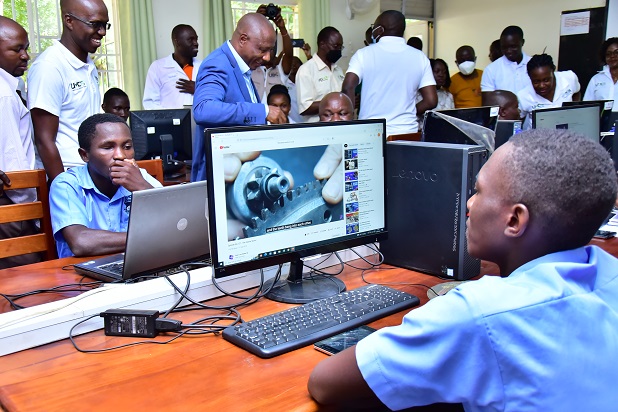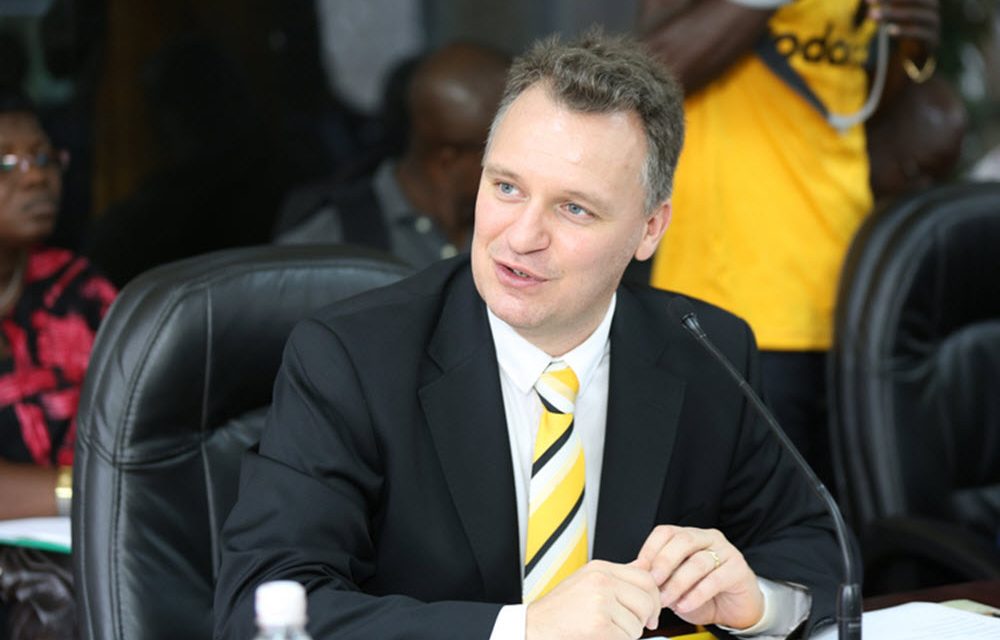President Museveni launching the Regional ICT Infrastructure Project in Gulu City last year. Under the Manifesto, the President promised to expand ICT services across the Country.
The Ministry of ICT & National Guidance (MoICT&NG) has registered a number of achievements in as far as the implementation of the NRM Manifesto commitments and strategic Presidential Directives (2021-2026) is concerned.
Below is a detailed report about the the Ministry of ICT & National Guidance performance in fulfilling the NRM Manifesto Commitments (2021-2026);
Agencies under MoICT&NG
• Uganda Communications Commission
• Uganda Institute of Information & Communications Technology
• Uganda Broadcasting Corporation
• Posta Uganda
• Uganda Telecom Company LTD.
• Vision Group
• Uganda Media Centre
• Media Council of Uganda
Network Coverage and Penetration
Voice Coverage
- Mobile Cellular Voice Coverage is near national.
- Mobile Cellular Geographic signal coverage stands at 80% of the Country. This translates into population coverage of 72% for basic voice.
- Geographical coverage of broad band services (3G) stands at 89% of the population.
Broadband Coverage
- 25 broadband sites upgraded from 2G to 3G providing broadband services to over 700,000 Ugandans.
- Implemented free wifi-hotspots at nine (09) border posts i.e. Lwakhaka, Mpondwe, Mutukula, Busia, Bunagana, Vurra, Katuna, Malaba and Elegu.

ICT Infrastructure Development
- A total of about 4,172 km of National Backbone Infrastructure (NBI) Fiber Optic cable laid across 58 Districts of Uganda.
- 1,447 Government sites (MDAs and LGs) connected to NBI.
- 281 Police stations and 9 UPDF sites connected to the NBI.
- NBI extended to Pakwach, Nebbi, Arua, Koboko, Yumbe, Moyo, Adjumani, Katakwi and Moroto.
- Border posts of Mpondwe, Vurra, Oraba, Elegu/Nimule connected to the NBI.
- The alternative routes to the sea cables completed through Mutukula, Katuna, Busia, Malaba.
- A National Data Centre and a Disaster Recovery Site established, fully equipped with state-of-the art technology which is utilized for Centralized Hosting Services, Disaster Recovery Services and other Data Centre Services for Government Applications & Data.
- National Data Centre currently hosts 199 applications for 66 entities.
- Free Wi-Fi (‘MyUg’) is provided to the general public in 580 locations in the Central Business District of Kampala and Entebbe. There are about 2 million users, monthly, on the MYUG platform each month.
- By the end of FY2020/21, mobile network coverage (3G or above) was available to 89% of the population.
- Tests for internet connectivity using Satellite technology conducted in tourist sites of Bwindi and Kidepo Valley National Parks.
- Validation of SIM Card Registration with National ID details was done.

Digitized Service Delivery
- Online Service Index: Improved from 50% in 2016 to 58.24% in 2020.
- National ICT Systems: 330 National ICT systems and databases in Government, up from 47 in 2015.
- Government Services: 71% of Government services are offered electronically via institutional websites, email, Social media, SMS and Mobile applications.
- e-Government services: Developed and rolled out a number of e-Government services. e-services rolled out: e-Payment Gateway, e-GP, GAMIS, iHMIS, OBRS, EMIS, e-Post Digital Platform, e-Docs, PDMIS.
- ICT-Based Community Centres: Public Access Points installed at; 12 Post Offices, 10 Public Libraries countrywide, supported Ministry of Public Service in the establishment of eService Centres around the Country e.g. Kasese and Jinja.
Parish Development Management Information System (PDMIS)
- 95% of the four modules (Data collection, Financial Information System, Citizen Participation, Monitoring and Evaluation) have been completed. Rolled out to ALL parishes across the Country.
- 50.4% of 9.8m households and 17.2m population i.e. 4,937,744 households registered.
DIGITAL SKILLS AND INNOVATION
Digital Literacy
- Over 1,150 School ICT labs equipped under Rural Communication Development Fund (RCDF).
- Over 3,000 teachers and school heads have been retooled in partnership with Ministry of Education and Sports.
- Over 10,000 SMEs trained in use of ICTs for business as part of the Digital Literacy Programme.
- Over 80 Sensitization sessions on cyber laws and cyber security conducted.
- Uganda Institute of ICT (UICT) Master Plan developed and Institute infrastructure refurbished.
- 5 specialized labs at UICT refurbished and equipped (i.e. Electronics Lab, Telecom Lab, Electrical Lab, Multimedia Lab, VUE Professional Testing and Certification Centre, Computer Laboratories (02) including the Server Room);
- UICT trained and graduated over 2,431 students in ICT skills specialties; trained and certified 1,037 SMEs in Citizenship Digital Literacy Skills ((market vendors, juwakali, tailors); certified 1,670 Professionals in specialized short courses in ICT and management such as CCNA, Fiber optics, Electronics and ITU courses, trained 1,249 participants the Covid-19 Workforce Recovery Initiative Programme; trained 764 participants from 95 Districts in ICT Digital Literacy using eLearning.

Digital Literacy for Special Interest Groups
- Completed training of 30 groups of People with Disabilities (PWDs) in partnership with National Union of Women with Disabilities of Uganda (NOWOUDU).
- Specialized ICT equipment for Persons with Special Needs deployed at Gulu High School for the Blind and Mbale School for the Deaf.
Digital Innovations
- Government is promoting ICT innovation to create jobs, to promote import substitution and to avoid over dependence on foreign ICT products.
- A National ICT Innovation Hub for 500 innovators has been constructed in Nakawa.
- Innovation grants have been given to 132 Innovators and to 6 private sector Innovation Hubs under the National ICT Initiatives Support Programme (NIISP).
- Locally developed eGovernment systems include eProcurement system, the Parish Model Management Information System, the Government Asset Management System, Education Management Information System, Electronic Document Management System, Integrated Health Management Information System and the ePost Digital Platform.
- Establishment of three regional ICT Innovation Hubs (Kabale University, Soroti University and Muni University).
- Partnerships have been made with academia like Makerere University and Wits University.
- The Ministry has partnerships with all the local private innovation hubs.
Development Of ICT Parks
- Land for IT/BPO Park provided by HE the President in Entebbe to facilitate job creation and innovation.
- Feasibility study for the park has been completed.
- Design works completed and stakeholder/public engagement undertaken.
- PPP proposal submitted to Privatization Unit for approval.

Business Process Outsourcing (BPO)
- Subsidised internet is being provided to 5 BPO/innovation companies i.e. Cameo Tech, Technobrain, Munu Tech, BDE consults and Cayman Consults.
- Government of Uganda BPO Center at Statistics House and private BPO centres are providing employment to the youth.
Community Mobilisation and Mindset Change
National Television Services
- The UBC national radio services have been restored in the areas of Kisoro, Rubirizi, Arua, Soroti and Lira, Mbarara, Masaka.
- This has improved radio network coverage from 60% to 70%.
- 8 brand new Television studio sets have been set up for UBC TV and Star TV.
- Digital Terrestrial Television (DTT) Free-to-Air network increased TV signal coverage from 20% in 2016 to 60% in 2023; and TV content providers/clients from 20 in 2017 to 40 in 2023.
Areas of focus in the next 3 years
- Implement last mile roll-out and connectivity of the broadband infrastructure.
- Connect all essential service centres to the NBI such as schools, hospitals, tourism sites, police, LGs.
- Support the roll-out and integration of e-services including e-education, e-health, remote collaboration etc.
- Develop and commercialize more local ICT products and build a critical mass of talent to develop them.
- Create employment opportunities through Business Processing Outsourcing & Innovation (BPO&I).
- Extend the scope of the Parish Development Management Systems (PDMIS) and roll-out out to the entire country.
- Strengthen communication of Government of Uganda programs.





